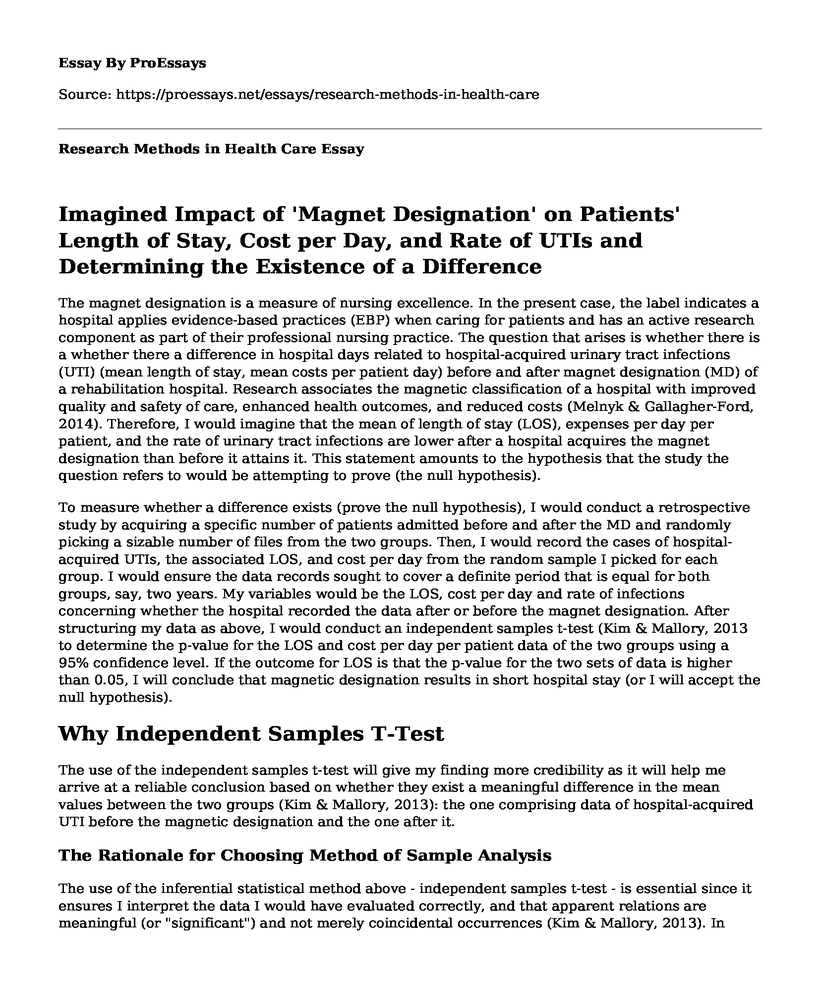Imagined Impact of 'Magnet Designation' on Patients' Length of Stay, Cost per Day, and Rate of UTIs and Determining the Existence of a Difference
The magnet designation is a measure of nursing excellence. In the present case, the label indicates a hospital applies evidence-based practices (EBP) when caring for patients and has an active research component as part of their professional nursing practice. The question that arises is whether there is a whether there a difference in hospital days related to hospital-acquired urinary tract infections (UTI) (mean length of stay, mean costs per patient day) before and after magnet designation (MD) of a rehabilitation hospital. Research associates the magnetic classification of a hospital with improved quality and safety of care, enhanced health outcomes, and reduced costs (Melnyk & Gallagher-Ford, 2014). Therefore, I would imagine that the mean of length of stay (LOS), expenses per day per patient, and the rate of urinary tract infections are lower after a hospital acquires the magnet designation than before it attains it. This statement amounts to the hypothesis that the study the question refers to would be attempting to prove (the null hypothesis).
To measure whether a difference exists (prove the null hypothesis), I would conduct a retrospective study by acquiring a specific number of patients admitted before and after the MD and randomly picking a sizable number of files from the two groups. Then, I would record the cases of hospital-acquired UTIs, the associated LOS, and cost per day from the random sample I picked for each group. I would ensure the data records sought to cover a definite period that is equal for both groups, say, two years. My variables would be the LOS, cost per day and rate of infections concerning whether the hospital recorded the data after or before the magnet designation. After structuring my data as above, I would conduct an independent samples t-test (Kim & Mallory, 2013 to determine the p-value for the LOS and cost per day per patient data of the two groups using a 95% confidence level. If the outcome for LOS is that the p-value for the two sets of data is higher than 0.05, I will conclude that magnetic designation results in short hospital stay (or I will accept the null hypothesis).
Why Independent Samples T-Test
The use of the independent samples t-test will give my finding more credibility as it will help me arrive at a reliable conclusion based on whether they exist a meaningful difference in the mean values between the two groups (Kim & Mallory, 2013): the one comprising data of hospital-acquired UTI before the magnetic designation and the one after it.
The Rationale for Choosing Method of Sample Analysis
The use of the inferential statistical method above - independent samples t-test - is essential since it ensures I interpret the data I would have evaluated correctly, and that apparent relations are meaningful (or "significant") and not merely coincidental occurrences (Kim & Mallory, 2013). In other words, the use of the inferential statistical analysis I refer to above would give my interpretation of some robustness. Moreover, the use of statistical inferential would allow me to make a general conclusion that covers other groups beyond the study sample (Simpson, 2015). That way, one can apply the findings to other infer that, universally, magnet designated hospitals have shorter LOS, low cost per day, and lower rates of UTIs once one accepts the null hypothesis.
References
Kim, M., & Mallory, C. (2013). Statistics for Evidence-Based Practice in Nursing. Burlington, MA: Jones & Bartlett Publishers.
Melnyk, B. M., & Gallagher-Ford, L. (2014). Using Evidence-Based Practice to Improve Healthcare Quality and Patient Outcomes. The Handbook of Behavioral Medicine, 203-220. doi:10.1002/9781118453940.ch12
Simpson, S. H. (2015). Creating a Data Analysis Plan: What to Consider When Choosing Statistics for a Study. The Canadian Journal of Hospital Pharmacy, 68(4). doi:10.4212/cjhp.v68i4.1471
Cite this page
Research Methods in Health Care. (2022, Mar 06). Retrieved from https://proessays.net/essays/research-methods-in-health-care
If you are the original author of this essay and no longer wish to have it published on the ProEssays website, please click below to request its removal:
- Immunology of Oral Candidiasis Paper Example
- Electronic Cigarettes Essay Example
- Essay Sample on Diabetes as One of the Major Global Public Health Problems
- Care Delivery Strategies: RN, LPN & Nursing Assistant Roles - Research Paper
- Nurses' Leadership in Transfer-of-Care Communication: Best Practices - Annotated Bibliography
- Human Papillomavirus: Cervical Cancer, Genital Warts, Vaccine Options - Essay Sample
- Essay on Youths' Increase in Hookah Smoking: Early Exposure & Mythical Beliefs







